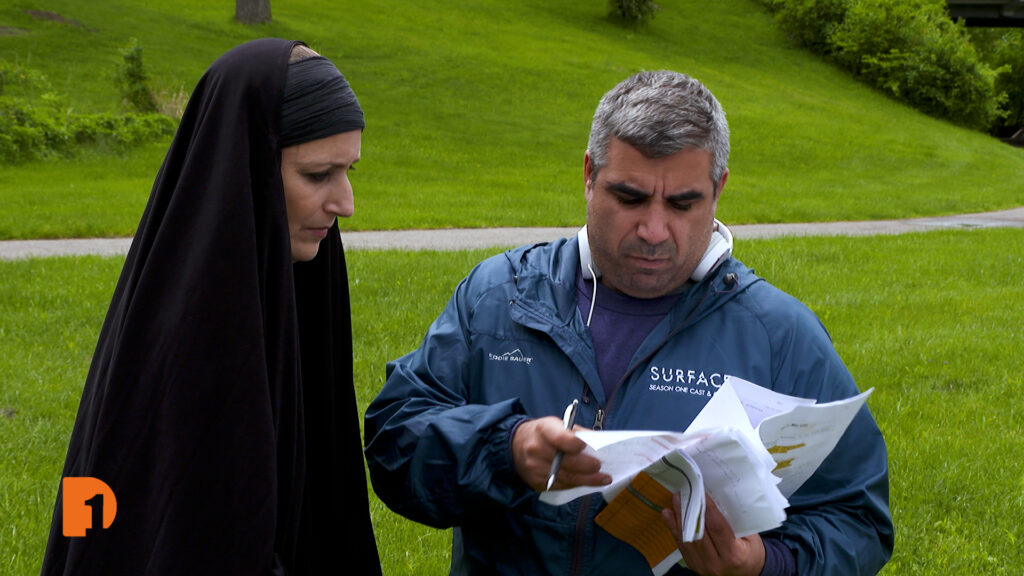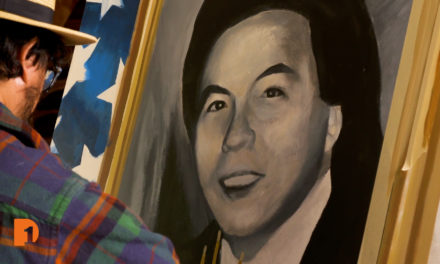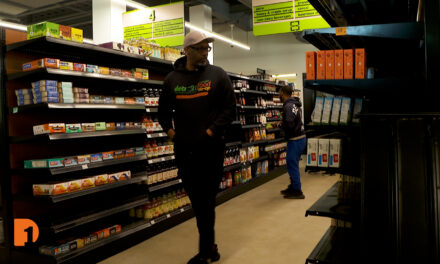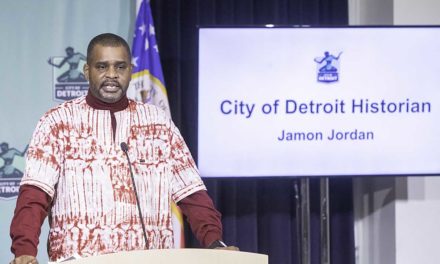When Michigan-born Iraqi American playwright Heather Raffo was offered the opportunity to re-make her seminal 2003 monologue play “9 Parts of Desire” as a film, it was more than just a chance to bring her play to the screen. It was an opportunity to write a whole new version, in light of the 20th anniversary of the start of the war in Iraq, and in light of the grief and trauma of the COVID pandemic.
RELATED: Detroit Public Theatre presents Heather Raffo’s ‘Noura,’ an Iraqi American story of belonging
“Nine Parts,” Raffo’s film adaptation, weaves a remarkable story about the lives and experiences of Iraqi and Iraqi-American women into a new modern story based on her own experience of losing her father to COVID in early 2020 and being unable to hold a funeral or grieve with loved ones. Raffo wrote and stars in the film as the sole actress in the movie performing as an ensemble of characters.

“Nine Parts” actress and playwright Heather Raffo on the film set in Flint, MI with Michigan director Mike Mosallam. | Photo by One Detroit
The film looks at what the experiences and rituals of Iraqi women can teach us about grief, division, and the chaotic state of America today. It was co-produced by Detroit Public Theatre and People’s Light Theatre in Pennsylvania. The film airs on Detroit Public TV at 9 p.m. Friday, March 24.
One Detroit’s Chris Jordan joined the production team on-location of the “Nine Parts” filming in Flint and Detroit in May 2022 for a behind-the-scenes look at how Raffo’s play was adapted into a screenplay. While on set, he talks with Raffo, producer Nilou Safinya and Detroit Public Theatre Producing Artistic Director Sarah Winkler about the inception of the filming, the importance of the story being retold in present day, and the similarities Raffo finds to the start of the Iraq war 20 years ago.
Full Transcript:
Sarah Winkler, Producing Artistic Director, Detroit Public Theater: We are on the last day of shooting of Heather Raffo’s ‘9 Parts’ in the of height of the COVID shutdowns when Detroit Public Theater could not be producing live theater. Detroit Public Television and Detroit Public Theater created a partnership around filming plays. And we were thinking about other solo shows that we could film. And because we have a strong connection to Heather, we reached out to her about her seminal play ‘9 Parts of Desire’ and said, “Would you consider doing this with us? And Detroit Public Television?”
Heather Raffo, Writer & Actress, 9 Parts: ‘9 Parts of Desire’ The play is a monologue play with nine characters, eight of whom are Iraqi and one of whom is Iraqi-American. And when it came out in 2003, it was the first play in the English language to feature an Iraqi female protagonist. And it was at a time where there was not a movement or even a genre of Middle Eastern theater in the American theater canon.
These nine Iraqi characters were speaking of love, of loss, of their resilience, of personal matters, of political matters. But I think that what was really essential to the work, was they were speaking in such a vulnerable and honest matter, that for Iraqis hearing the material, they thought, oh my God, how can you say this on stage? Like, it’s so personal, it’s so truthful. And American audiences also found it so heartfelt. I think people coming to a play about Iraq during the Iraq war assumed it would be agitprop, assumed a political agenda. So, to meet these women with the honesty, and vulnerability, and life force from which they were speaking was profound.
The summer of 2020, when Detroit Public Theater and People’s Light Theater in Pennsylvania approached me about filming the solo show during our COVID era. And the evolution of that offer became wanting to do a film version of it and not wanting to film the stage play of it. I was, you know, offered the space and the support to literally write a screenplay version that has a very different focus and adaptation, a different narrative adaptation to it that sets it in a post-2020 timeframe.
Sarah Winkler: It had already been conceived as a film project, and it kind of terrified DPT because we’re not film producers. We knew what to do, particularly in this partnership with Detroit Public Television, around filming a solo play. But we didn’t know what to do around making a film, but it was already in motion, and it serves the piece in a way that just shooting it as a play was not going to serve the piece. We have been so lucky. We’re working with Mike Mazzola who is Michigan’s director. We’re working with Nilou Safinya and Heather, this is a crew that knows exactly what they’re doing in film.
Nilou Safinya, Producer, 9 Parts: When it came to turning it into a film, it really was, it was more about why now? Why are we telling this story now as a film? Why Michigan? Why 2020? Which is where we based it. What are the motivations for these things that don’t seem trivial? It’s a very palpable time in our country and a political way in a social way and in 2020, even more so. And Heather has spent a lot of her career researching wars, understanding wars between the Middle East, between here.
And she has always looked to the Iraq war as sort of a harbinger for what’s to come in America in a lot of ways. And so, that’s something that’s very prevalent in her work. And at the beginning of the pandemic, we were in this space where, you know, things felt like we were maybe going to be in some sort of a war situation. We continue. I mean, we started this year feeling like we were going into a World War III situation, and things continue to be really tense around that. And for the Michigan thing, there’s something about Michigan and its political existence and the fabric of the country that makes it a really interesting place to tell a story like that.
Heather Raffo: 2020 was a really rough time to be in a swing state. Like you could feel the pressure and the heat of everybody’s opinions and how they were you know, there was such strong opinions on on both sides. And I’ll say, as a person born and raised in Michigan and having lived in many places, that the kind of way Iraqis talk about how their civil war came to happen, didn’t feel different or distinct from what I was seeing and sensing in my own nation. So, I really wanted to offer up this new film adaptation as a bit of a bellwether of saying that these things that we think could never, ever happen, can be closer than you think.
[Film Dialogue] When Dad went into the hospital, the whole country was shutting down. I threw my kids in a rental to drive across country. I was afraid to drive to Michigan with New York license plates. It’s coming from the epicenter and the country was at war.
Heather Raffo: The theater and the arts can often hold a place for cultural markers. And that’s really where I approach this 2020 rewrite for film, was realizing what we’d all been living since 2020 with COVID, with over a million lost and not seeing a sort of national reckoning with our own grief. I lost my dad during 2020 and we didn’t get to have a funeral and we didn’t get to bury him, and I couldn’t be in his hospital room.
So, the approach of this film was to honor how common that was across our nation. And that maybe what Iraqis and Iraqi women might have to offer us with grief rituals or speaking honestly to loss, and resilience, and love, and life force during really rough times, was a parallel I wanted to work with. The narrative story of this piece came through the inspiration of a friend whose father is the deacon of the oldest Iraqi church in North America, which happens to be in Flint, Michigan.
The inspiration for the narrative really came from thinking about that church and thinking about what a solace it might be in times where we couldn’t gather, in times where we couldn’t grieve or have public funerals. What it might be like to go into a church on one’s own in private and create one’s own rituals. So, it started really from my own sense of search, my own feeling of being uprooted after I lost my dad, my own feeling of, well, can I have an attachment to Iraq if my Iraqi connection has been gone?
There was also a feeling in me because so much of my Iraqi family had scattered in the last ten years when ISIS took Mosul, it was really a time where there was a moment when I looked back and said, Oh, at the start of the war, I had 100 relatives or so living in Iraq, and now I have two. So, this idea of a root system that I could always go back to or I’ll always have relatives there that can take my kids, was now a diaspora. I felt more profoundly a sense of myself as part of this diaspora of a root system severed.
[Film Dialougue] But the Isis took so dementia took Mosul, dementia took my dad. He spent 80 years carrying and six years forgetting. A few times he cried, it was lifetimes. I mean, I just never saw anything like it.
Heather Raffo: The narrative story that we ended up finding for the screenplay was that the one Iraqi American character would arrive to this church to enact a ritual in hopes to grieve her dad in her isolated mourning during COVID. And that these other women, Iraqi women that you would have met in the stage play come to her in ancestry and come to her in spirit. And sometimes she thinks she’s just hearing them. Sometimes she’s realizing that they’re almost like living inside her. I think there’s also a moment where she probably thinks she’s going insane.
Nilou Safinya: From a film perspective, a one-woman, one-man film is very rare. You don’t see that often. The monologues are beautifully written. It comes from real stories and women that Heather has met. We had our first scene talks about how moved she was by one of the monologues that have brought her to tears. Our Gaffer talked about that as well. I don’t think you experience that, that often, where every crew member is really listening to the story and the words being said and really investing in that.
Sarah Winkler: This will be the first time that Detroit Public Theater has had an opportunity to reach out through our work really, really directly to the Middle Eastern American community that is so large in our region. It’s also very important to us as women, we are a female-run theater. And this play, in particular, addresses the effects of war and the effects of living in authoritarian regimes on women. So, it’s an extremely important story, we felt like, to tell it this time.
Nilou Safinya: I think with content like this, you’re always hoping to broaden people’s minds a little bit. If people walk away wanting to ask more questions, learn a little bit more about Iraq, about the war, about refugees, about Islam, about America, about America’s role in different countries wars, about our politics here on our own ground, anything that makes people start to question something. I think that’s the goal of films like this.
Heather Raffo: This film is quite celebratory. As much as I’ve mentioned the term grief, having gone through my own, there’s a release to it. I mean, that’s why we need art. We need art to take us there and take us through it. And have us feel something spiritually or in our heart that we hadn’t thought maybe we even needed to feel.
[Film DIalogue] I love you. I love you. I love you.
Stay Connected:
Subscribe to One Detroit’s YouTube Channel & Don’t miss One Detroit Mondays and Thursdays at 7:30 p.m. on Detroit Public TV, WTVS-Channel 56.
Catch the daily conversations on our website, Facebook, Twitter @DPTVOneDetroit, and Instagram @One.Detroit
View Past Episodes >
Watch One Detroit every Monday and Thursday at 7:30 p.m. ET on Detroit Public TV on Detroit Public TV, WTVS-Channel 56.




